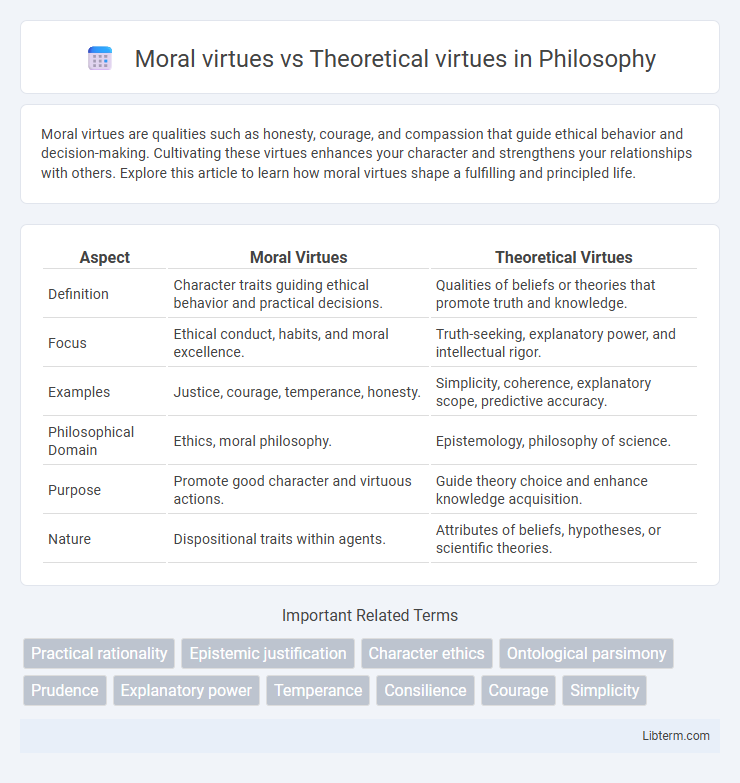Moral virtues are qualities such as honesty, courage, and compassion that guide ethical behavior and decision-making. Cultivating these virtues enhances your character and strengthens your relationships with others. Explore this article to learn how moral virtues shape a fulfilling and principled life.
Table of Comparison
| Aspect | Moral Virtues | Theoretical Virtues |
|---|---|---|
| Definition | Character traits guiding ethical behavior and practical decisions. | Qualities of beliefs or theories that promote truth and knowledge. |
| Focus | Ethical conduct, habits, and moral excellence. | Truth-seeking, explanatory power, and intellectual rigor. |
| Examples | Justice, courage, temperance, honesty. | Simplicity, coherence, explanatory scope, predictive accuracy. |
| Philosophical Domain | Ethics, moral philosophy. | Epistemology, philosophy of science. |
| Purpose | Promote good character and virtuous actions. | Guide theory choice and enhance knowledge acquisition. |
| Nature | Dispositional traits within agents. | Attributes of beliefs, hypotheses, or scientific theories. |
Understanding Moral Virtues
Moral virtues, such as courage, temperance, and justice, are character traits guiding individuals to act ethically and foster harmonious social relationships. Understanding moral virtues involves recognizing their role in cultivating practical wisdom (phronesis), which enables sound decision-making aligned with moral principles. Unlike theoretical virtues that prioritize truth-seeking and intellectual inquiry, moral virtues emphasize the development of habits that shape moral character and promote human flourishing.
Defining Theoretical Virtues
Theoretical virtues are qualities that enhance scientific theories, including simplicity, explanatory power, coherence, and predictive accuracy. These virtues help scientists evaluate and choose between competing hypotheses by emphasizing clarity, scope, and empirical adequacy. Unlike moral virtues, which pertain to character and ethical behavior, theoretical virtues are criteria for assessing the intellectual merit and reliability of knowledge claims.
Historical Contexts of Virtue
Historical contexts of virtue reveal a clear distinction between moral virtues, such as justice, courage, and temperance, which guide ethical behavior and social conduct, and theoretical virtues, including truth, coherence, and explanatory power, which pertain to intellectual pursuits and knowledge acquisition. Ancient philosophers like Aristotle emphasized moral virtues as essential for human flourishing (eudaimonia), while later thinkers in the scientific revolution highlighted theoretical virtues in developing robust scientific theories. The interplay between these virtues shaped the evolution of ethical frameworks and epistemological standards throughout history.
Key Differences Between Moral and Theoretical Virtues
Moral virtues, such as courage, temperance, and justice, regulate emotions and actions to align with ethical principles and societal well-being, while theoretical virtues, like truth, coherence, and simplicity, pertain to intellectual pursuits and the acquisition of knowledge. Moral virtues are cultivated through habituation and guide practical behavior, whereas theoretical virtues emphasize the clarity and reliability of beliefs in scientific and philosophical inquiry. The key difference lies in moral virtues addressing character and conduct, and theoretical virtues focusing on the integrity and soundness of reasoning and understanding.
The Role of Moral Virtues in Ethical Judgment
Moral virtues such as honesty, courage, and compassion play a crucial role in ethical judgment by shaping individuals' character and guiding their decisions towards moral good. These virtues foster consistent moral behavior, enabling individuals to evaluate situations with empathy and integrity, which theoretical virtues like coherence or simplicity may not directly address. The integration of moral virtues ensures ethical judgments are not only rational but also aligned with human well-being and social harmony.
The Function of Theoretical Virtues in Scientific Reasoning
Theoretical virtues such as simplicity, coherence, explanatory power, and scope serve as essential criteria for evaluating scientific theories, guiding researchers toward more reliable and robust explanations of phenomena. Unlike moral virtues, which govern character and behavior, theoretical virtues function as epistemic tools that enhance the justification and acceptance of scientific hypotheses. Their application in scientific reasoning promotes objectivity and consistency, ultimately advancing the progress and cumulative knowledge within scientific disciplines.
Applications in Philosophy and Practice
Moral virtues, such as courage and honesty, primarily guide ethical behavior and decision-making in personal and social contexts, emphasizing character development and interpersonal relationships in philosophy and practical life. Theoretical virtues like simplicity, coherence, and explanatory power play a crucial role in epistemology and the philosophy of science by shaping theory choice and scientific methodology. Applying these virtues ensures a balanced approach to both ethical living and rational inquiry, enhancing moral integrity while fostering intellectual clarity and progress.
Debates and Critiques in Virtue Theory
Debates around moral virtues and theoretical virtues focus on their distinct roles in guiding ethical behavior versus promoting intellectual understanding, with critics arguing that virtue theory sometimes conflates or inadequately differentiates these virtues. Scholars challenge the balance virtue theory strikes between character development oriented toward practical moral excellence and cognitive virtues aimed at truth-seeking, highlighting tensions in prioritizing one over the other. The critique emphasizes the need for clearer criteria to separate evaluative frameworks for virtues that govern action from those that govern belief formation, impacting the coherence and applicability of virtue ethics.
Bridging Moral and Theoretical Virtues
Bridging moral virtues and theoretical virtues involves recognizing the integral role that ethical dispositions play in the pursuit of knowledge and intellectual inquiry. Moral virtues such as honesty, courage, and integrity ensure responsible and unbiased engagement with evidence, while theoretical virtues like simplicity, coherence, and explanatory power guide the selection and evaluation of scientific theories. This synthesis emphasizes that cultivating moral virtues enriches intellectual practices, fostering a holistic approach where ethical character supports the attainment and application of truth.
Future Directions in Virtue Analysis
Future directions in virtue analysis emphasize integrating moral virtues such as justice, courage, and temperance with theoretical virtues like coherence, simplicity, and explanatory power to develop a comprehensive framework. Research is expanding on how moral virtues influence epistemic practices, enhancing the interplay between ethical considerations and knowledge acquisition. Emerging interdisciplinary approaches aim to refine virtue epistemology by examining how cognitive virtues shape moral character and vice versa, fostering a dynamic understanding of human rationality and ethical development.
Moral virtues Infographic

 libterm.com
libterm.com